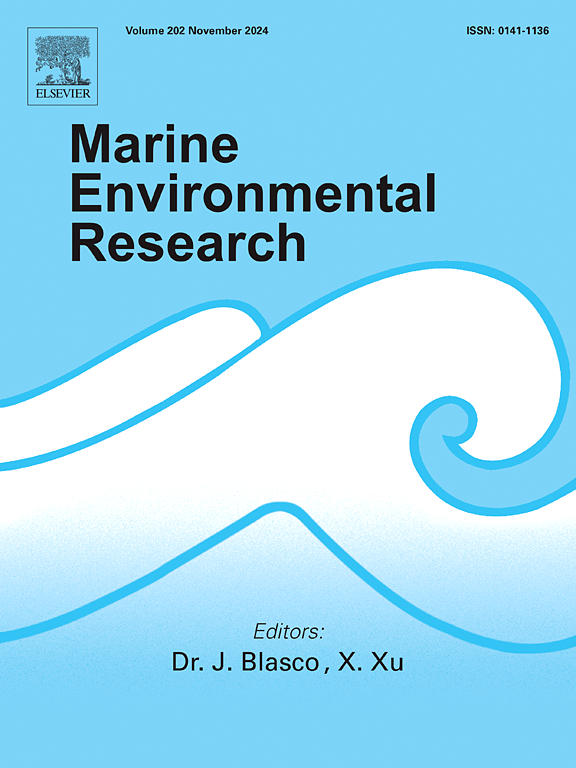海洋变暖对巴西造礁珊瑚Mussismilia braziliensis精子活力和氧化状态的影响(Verrill, 1868)
IF 3.2
3区 环境科学与生态学
Q2 ENVIRONMENTAL SCIENCES
引用次数: 0
摘要
人为活动造成的气候变化导致地球大气温度升高,从而导致海洋温度升高。珊瑚礁对环境变化高度敏感,并且考虑到它们是至少25%的海洋生物的家园,对浅水珊瑚礁的影响可能会对人类社会造成不可逆转的损害。尽管严重的白化事件是珊瑚面临的最大威胁之一,但人们对海洋温度上升如何影响热带南大西洋珊瑚在边际浑浊条件下的繁殖知之甚少。因此,本研究旨在评估温度升高对巴西特有造礁物种Mussismilia braziliensis精子活力的影响。精子暴露在不同的温度下:累西腓福拉当地温度28°C;29.7°C,考虑到较温和的情景RCP2.6;考虑到IPCC气候预估的最关键情景RCP8.5,为32.8°C。精子活力和氧化参数状态评估至产卵后7小时。我们观察到,在较高的温度下,精子的活力迅速下降,影响精子在产卵后的生存能力。此外,随着温度的升高和时间的延长,形态正常的精子数量减少,鞭毛损伤增加。脂质过氧化、蛋白质羰基和还原型谷胱甘肽水平在不同温度下没有变化。这是首次在海洋变暖的情况下对巴西musismilia brasiliensis的精子进行评估。从这项研究中获得的信息可能有助于更好地了解广播产卵者如何在广泛的海洋温度范围内进行有性繁殖。本文章由计算机程序翻译,如有差异,请以英文原文为准。

Influences of ocean warming on sperm viability and oxidative status of the Brazilian reef-building coral Mussismilia braziliensis (Verrill, 1868)
Climate changes from anthropogenic activities have resulted in increased temperature in the Earth's atmosphere and, consequently, in the ocean. Coral reefs are highly sensitive to environmental variations, and considering they are home to at least 25 % of all marine life, impacts on shallow-water reefs can lead to irreversible damages to human society. Despite one of the biggest threats to corals has been the severe bleaching events, little is known about how the increasing ocean temperature impacts reproduction of Tropical South Atlantic corals under marginal turbid conditions. Thus, this study aimed to evaluate the impacts of increasing temperature on sperm viability of the endemic reef-building species Mussismilia braziliensis. Spermatozoa were exposed to different temperatures: 28 °C, Recife de Fora local temperature; 29.7 °C, considering the milder scenario RCP2.6; and 32.8 °C considering the most critical scenario RCP8.5 of IPCC climate projections. Sperm viability and oxidative parameters status were assessed up to 7 h after spawning. We observed that at higher temperatures sperm motility drops rapidly, compromising spermatozoa viability right after spawning. Furthermore, as the temperature increased and time passed, there was a drop in spermatozoa exhibiting normal morphology and an increase in flagella damages. Lipid peroxidation, protein carbonyl and reduced glutathione levels did not change among temperatures. This is the first time that spermatozoa of Mussismilia braziliensis is evaluated in an ocean warming scenario. Information gained from this study may help to better understand how broadcast spawners deal with sexual reproduction in a wide spectrum of ocean temperatures.
求助全文
通过发布文献求助,成功后即可免费获取论文全文。
去求助
来源期刊

Marine environmental research
环境科学-毒理学
CiteScore
5.90
自引率
3.00%
发文量
217
审稿时长
46 days
期刊介绍:
Marine Environmental Research publishes original research papers on chemical, physical, and biological interactions in the oceans and coastal waters. The journal serves as a forum for new information on biology, chemistry, and toxicology and syntheses that advance understanding of marine environmental processes.
Submission of multidisciplinary studies is encouraged. Studies that utilize experimental approaches to clarify the roles of anthropogenic and natural causes of changes in marine ecosystems are especially welcome, as are those studies that represent new developments of a theoretical or conceptual aspect of marine science. All papers published in this journal are reviewed by qualified peers prior to acceptance and publication. Examples of topics considered to be appropriate for the journal include, but are not limited to, the following:
– The extent, persistence, and consequences of change and the recovery from such change in natural marine systems
– The biochemical, physiological, and ecological consequences of contaminants to marine organisms and ecosystems
– The biogeochemistry of naturally occurring and anthropogenic substances
– Models that describe and predict the above processes
– Monitoring studies, to the extent that their results provide new information on functional processes
– Methodological papers describing improved quantitative techniques for the marine sciences.
 求助内容:
求助内容: 应助结果提醒方式:
应助结果提醒方式:


